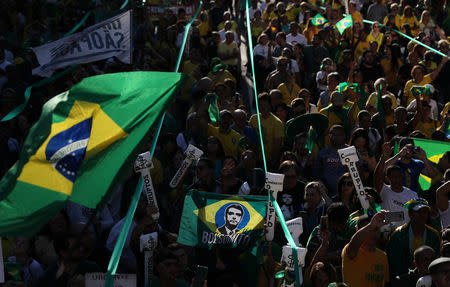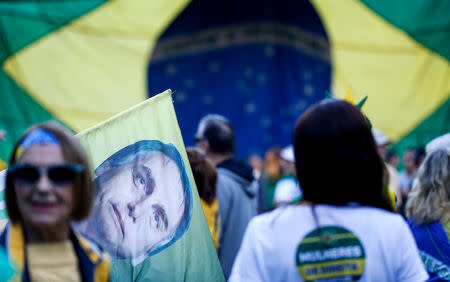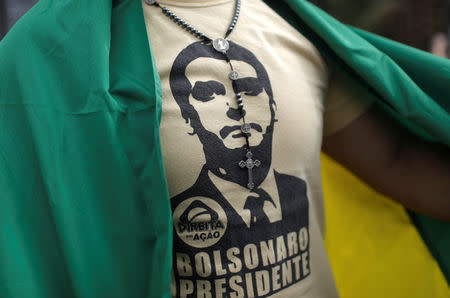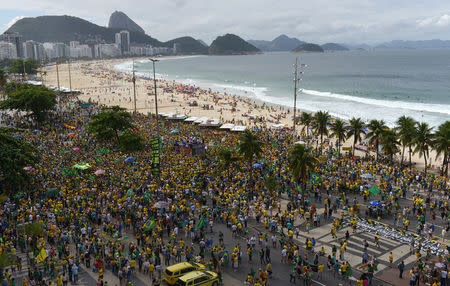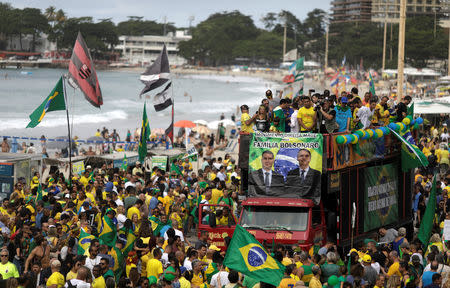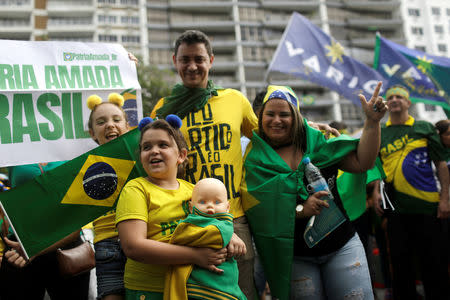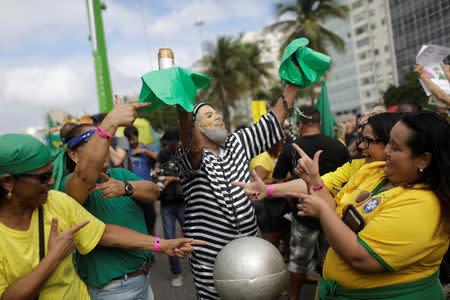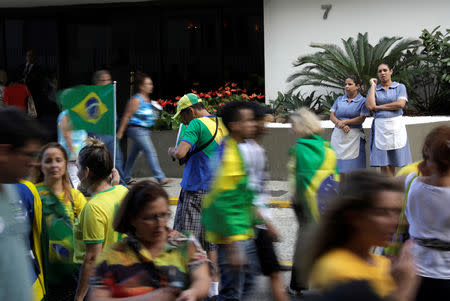Brazilians demonstrate to pressure Congress to approve Bolsonaro's reforms
By Brad Brooks and Rodrigo Viga Gaier
SAO PAULO/RIO DE JANEIRO (Reuters) - Brazilians gathered in cities on Sunday to show their support for far-right President Jair Bolsonaro and to protest against lawmakers whom they see as putting up roadblocks to the leader's legislative agenda.
There was not yet any official estimates on crowds, but they appeared smaller than May 15 protests against Bolsonaro and his government's planned spending freeze on education that sent tens of thousands into streets in around 200 cities, the largest protests in Brazil since Bolsonaro took office.
On Sunday, there were pro-government rallies in 52 cities, according to news website G1.
Bolsonaro easily won the election last November, but since taking office on Jan. 1 his popularity has plummeted in several polls. A survey released on Friday showed more Brazilians disapprove of his government than approve it, a surprisingly fast erosion of popularity.
Those in the streets on Sunday argue that Brazil's corrupt political system has not allowed Bolsonaro to push through his legislative agenda and make progress in critical areas like security, education and the economy. They say that Bolsonaro is standing by his core pledge to not engage in the traditional political horse trading in Brasilia that is largely blamed for stunning levels of corruption in the nation's political class.
Bolsonaro initially considered participating in the demonstrations, but later decided not to and recommended the government's ministers not join. Protesters gathered in Rio de Janeiro, Sao Paulo, Belo Horizonte and Brasilia
In Rio de Janeiro, most demonstrators in the famous Copacabana Beach wore Brazil soccer team t-shirts and protested against Lower House speaker Rodrigo Maia and the Supreme Court.
"I have voted years for the left, but I am now worried about the future of the country. I hope the demonstrations influence Congress," said Carley Farias.
Demonstrators brought an inflatable doll of Maia with logos of companies accused of paying him bribes, alongside an inflatable doll of former President Luiz Inacio Lula da Silva dressed in a striped jail suit, known as "Pixuleco".
"Maia needs to wake up and help the country," Jose Antonio de Souza told Reuters while demonstrating in Copacabana.
Speaking in a church in Rio on Sunday, Bolsonaro said the demonstrations were a response "to those that insist on keeping old practices and do not allow the people to be free".
Bolsonaro promised voters that he would secure an economic turnaround in part by reforming the pension system, that he would greatly improve Brazil's precarious security situation and would end rampant corruption that has ensnared the country's political and business elites in unprecedented anti-graft investigations during the past five years.
While those are ambitious goals that will take time to make progress on, many of those who voted for Bolsonaro have grown frustrated with what are seen as unnecessary and incendiary tweets he and his politician-sons send out daily and the infighting between the military and far-right ideologue wings of his government, which is blamed for the few concrete accomplishments his team has made.
"Most demonstrators on the streets were asking for legitimate and democratic measures, but there are still people trying to distort the facts," Bolsonaro tweeted on Sunday afternoon.
(Reporting by Brad Brooks in Sao Paulo and Rodrigo Viga Gaier in Rio; writing by Tatiana Bautzer; Editing by Lisa Shumaker and Susan Thomas)

 Yahoo News
Yahoo News 

